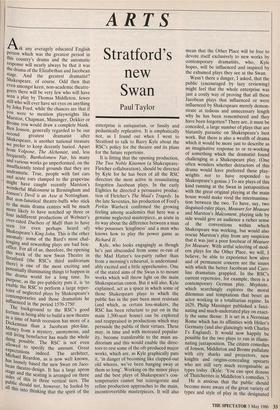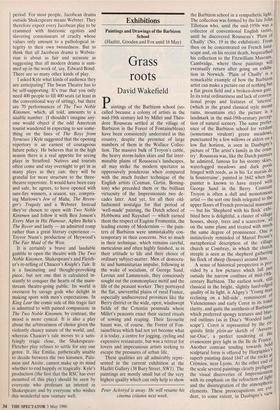ARTS
sk any averagely educated English
A
person which was the greatest period in this country's drama and the automatic response will nearly always be that it was the drama of the Elizabethan and Jacobean stage. And the greatest dramatist? Shakespeare, of course. Odd then that even amongst keen, non-academic theatre- goers there will be very few who will have seen a play by Thomas Middleton, fewer Still who will ever have set eyes on anything by John Ford, while the chances are that if You were to mention playwrights like Marston, Chapman, Massinger, Dekker or Brome you would draw a complete blank. Ben Jonson, generally regarded to be our second greatest dramatist after Shakespeare, is another national treasure we prefer to keep decently buried. Apart from Volpone, The Alchemist, and, less frequently, Bartholomew Fair, his many and various works go unperformed, on the insufficiently tested grounds that they are undramatic. True, people with fast cars and acute ears clamped to the grapevine might have caught recently Marston's wonderful Malcontent in Birmingham and Jonson's Devil is an Asse at Nottingham. But non-fanatical theatre-buffs who stick to the main drama centres will be much more likely to have notched up three or four indifferent productions of Webster's over-rated Duchess of Malfi than to have seen (or even perhaps heard of) Shakespeare's King John. This is the other anomaly: some of the Bard's most chal- lenging and rewarding plays are bad box- Office. For all of us, therefore, the opening this week of the new Swan Theatre in Stratford (the RSC's third auditorium there) is one of the most exciting and Potentially illuminating things to happen in the drama world for a long time. Its Purpose, as the pre-publicity puts it, is 'to enable the RSC to perform a large reper- toire of neglected plays by Shakespeare's contemporaries and those dramatists he influenced in the period 1570-1750'. The background to the RSC's good fortune in being able to build a new theatre in a time of harsh recession has more of a Dickensian than a Jacobean plot-line. Money from a mystery, anonymous, and still living benefactor has made the whole thing possible. The RSC is not even allowed to specify the amount. Great expectations indeed. The architect, M_ ichael Reardon, as is now well known, has loosely based the new Swan on Jaco- bean theatre-design. It has a large apron stage and the seating is arranged on three Sides of this in three vertical tiers. The Public should not, however, be fooled by all this into thinking that the spirit of the
Stratford's new Swan
Paul Taylor
enterprise is antiquarian, or fussily and pedantically replicative. It is emphatically not, as I found out when I went to Stratford to talk to Barry Kyle about the RSC's policy for the theatre and its plans for the future repertoire.
It is fitting that the opening production, The Two Noble Kinsmen (a Shakespeare- Fletcher collaboration), should be directed by Kyle for he has been of all the RSC directors the most active in resuscitating forgotten Jacobean plays. In the early Eighties he directed a persuasive produc- tion of Fletcher's The Maid's Tragedy. In the late Seventies, his production of Ford's Perkin Warbeck confirmed the growing feeling among academics that here was a genuine neglected masterpiece, as acute in its way about the difference between a man who possesses `kingliness' and a man who knows how to play the power game as Richard II.
Kyle, who looks engagingly as though he's just absconded from some re-run of the Mad Hatter's tea-party rather than from a morning's rehearsal, is understand- ably excited and a little apprehensive. One of the stated aims of the Swan is to mount works which will throw light on the main Shakespearian canon. But it will also, Kyle explained, act as a space in which some of those Shakespeare plays to which the public has in the past been most resistant (and which, as certain loss-makers, the RSC has been reluctant to put on in the main 1,500-seat house) can be explored and reappraised in productions which may persuade the public of their virtues. These may, in time and with increased popular- ity, become transferable to the main au- ditorium and this would enable the direc- tors to rest some of the oft-produced major works, which are, as Kyle graphically puts it, 'in danger of becoming like clapped-out old whores, we've been banging away at them so long'. Working on the minor plays and the best plays of Shakespeare's con- temporaries cannot but reinvigorate and refine production approaches to the main, incontrovertible masterpieces. It will also mean that the Other Place will be free to devote itself exclusively to new works by contemporary dramatists, who, Kyle hopes, will be influenced and inspired by the exhumed plays they see at the Swan. Wasn't there a danger, I asked, that the public (encouraged by lazy reviewing) might feel that the whole enterprise was just a costly way of proving that all these Jacobean plays that influenced or were influenced by Shakespeare merely demon- strate at tedious and unnecessary length why he has been remembered and they have been forgotten? There are, it must be conceded, a large number of plays that are blatantly parasitic on Shakespeare's best work. But there is also a wealth of drama which it would be more just to describe as an imaginative response to or re-working of something which the dramatist found challenging in a Shakespeare play. (One often wonders whether detractors of this drama would have preferred these play- wrights not to have responded to Shakespeare's genius.) To see plays of this kind running at the Swan in juxtaposition with the great original playing at the main house would make vivid the interinanima- tion between the two. To have, say, two disguised-ruler plays, Measure for Measure and Marston's Malcontent, playing side by side would give an audience a richer sense of the conventions within which Shakespeare was working, but would also rescue Marston's play from any suspicion that it was just a poor forebear of Measure for Measure. With artful selecting of mod- ern plays for the Other Place, we will, I believe, be able to experience how alive and of permanent concern are the issues with which the better Jacobean and Caro- line dramatists grappled. In the RSC's current repertoire, for example, there is a contemporary German play, Mephisto, which searchingly explores the moral dilemmas and temptations that beset an actor working in a totalitarian regime. In 1629, Philip Massinger published a fasci- nating and much-underrated play on exact- ly the same theme. It is set in a Neronian Rome which has its affinities with Hitler's Germany (and also glancingly with Charles I's England). It would now happily be possible for the two plays to run in illumi- nating juxtaposition. The citizen comedies of Jonson, Middleton and Brome pullulate with city sharks and projectors, new knights and origins-concealing upstarts who are still very much recognisable as types today. (Kyle: 'You can spot dozens of Thatcherites in Middleton's comedies.') He is anxious that the public should become more aware of the great variety of types and style of play in the designated period. For most people, Jacobean drama outside Shakespeare means Webster. They therefore expect every Jacobean play to be crammed with histrionic egotists and slavering connoisseurs of cruelty whose values only amount to a pathological in- tegrity to their own twistedness. But to think that all Jacobean drama is Webste- rian is about as fair and accurate as suggesting that all modern drama is sum- med up in the work of, say, Edward Bond. There are so many other kinds of play.
I asked Kyle what kinds of audience they are anticipating? The Swan Theatre has to be self-supporting. It's true that you only need 400 people to fill 400 seats (at least in the conventional way of sitting), but there are 70 performances of The Two Noble Kinsmen, which, all told, amounts to a sizable number. (I shouldn't imagine any- one would object if the odd American tourist wandered in expecting to see some- thing on the lines of The Boys from Syracuse.) Kyle suggested that the opening repertory is an earnest of courageous future policy. He believes that in the high season there is a real appetite for seeing plays in Stratford. Natives and tourists often come and stay overnight to get in as many plays as they can: they will be grateful for more structure to the three- theatre repertoire. It would have been easy and safe, he agrees, to have opened with sure-fire winners, a season, say, compris- ing Marlowe's Jew of Malta, The Reven- ger's Tragedy and a Webster. Instead they've chosen to open with Two Noble Kinsmen and follow it with Ben Jonson's Every Man in His Humour, Aphra Behn's The Rover and lastly — an admitted romp rather than a great literary experience — Trevor Nunn's production of Heywood's The Fair Maid of the West.
It is certainly a brave and laudable gamble to open the theatre with The Two Noble Kinsmen, Shakespeare's and Fletch- er's re-telling of Chaucer's Knight's Tale. It is a fascinating and thought-provoking piece, but not one that is calculated in- stantly to conquer the hearts of the main- stream theatre-going public. Its world is overseen by savage gods who delight in making sport with men's expectations. In King Lear the comic side of this tragic fact is admitted to with pained compassion: in The Two Noble Kinsmen, by contrast, the mood is more cynical. It is also a play about the arbitrariness of choice given the violently chancy nature of the world, and, whereas Chaucer's tale moves to a satis- fyingly tragic close, the Shakespeare- Fletcher play refuses to settle for any one genre. It, like Emilia, pathetically unable to decide between the two kinsmen, Pala- mon and Arcite, cannot make up its mind whether to end happily or tragically. Kyle's production (the first that the RSC has ever mounted of this play) should be seen by everyone who professes an interest in Shakespeare and by everyone who wishes this wonderful new venture well.



















































 Previous page
Previous page